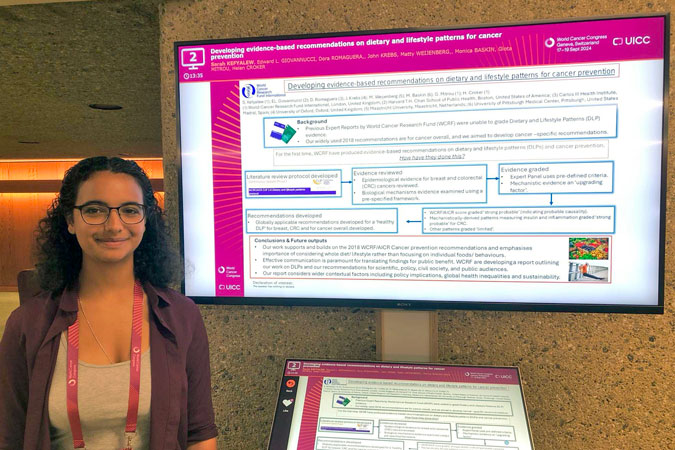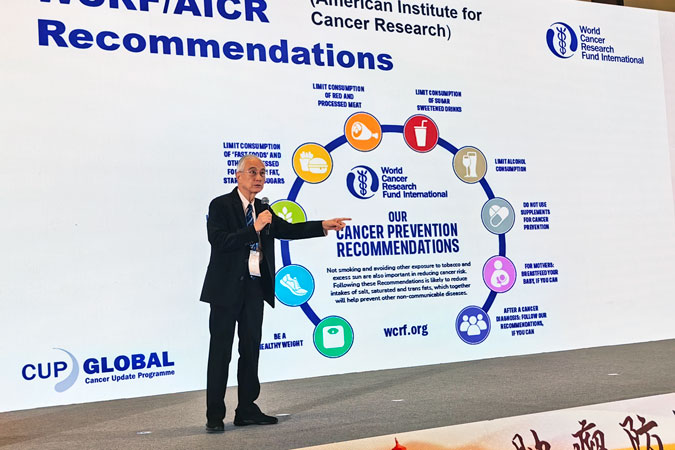The Research Interpretation team’s year in numbers

Here is our year in numbers
1 shared vision to stop preventable cancer
Estimated figures show that approximately 40% of cancers could be prevented by modifying key risk factors such as smoking, poor diets, obesity, low physical activity levels, and alcohol consumption.
Our Research Interpretation team have worked hard to deepen our understanding of the factors influencing the risk of developing, and the chance of surviving, a cancer.
5 CUP Global Panel meetings on the risk factors cancer incidence and survivorship
We have met with our CUP Global Expert Panel (a group of world-renowned independent experts from a variety of disciplines) to discuss the scientific evidence that early life body measurements affect later risk of developing breast cancer, as well as the evidence of the impact of physical activity, diet and adiposity (fatness) has on quality of life after a colorectal cancer diagnosis.
We have also formulated new recommendations for the public on the impact of various dietary lifestyle patterns on cancer incidence, following our discussions with the CUP Expert Panel.
99 associations reviewed by the CUP Global experts
There are many modifiable factors that may be associated with developing cancer, or worsen cancer prognosis after diagnosis. This year, we reviewed 99 of them from across the cancer survivorship and cancer incidence evidence.
2 reports published on cancer survivorship
This year, we released 2 reports that summarise the complex evidence on diet, nutrition, physical activity and body weight for people living with and beyond breast and colorectal cancers. Drawing on that evidence and additional inputs from experts, health professional and patients, we produced practical guidance for patients.
We now recommend that, “after a breast cancer diagnosis, people are physically active. However, physical activity should be increased under the supervision of healthcare professionals”. We also outline recommendations for future research, as lots remains to be done in this field.
9 peer-reviewed papers; 5 published, 4 under review.
Five CUP Global peer-reviewed papers have been published this year in academic journals, to share our findings with the scientific community.
Three of them reported on the impact of sedentary behaviour, body fatness, or dietary factors and supplement use after a colorectal cancer diagnosis, while a 4th paper summarised the strength of this evidence. Our CUP Global findings on the effect of dietary and lifestyle patterns and breast cancer incidence were also published in 2024.
Another 4 manuscripts are under peer review. They report on the latest CUP Global work, including the effect of both dietary and lifestyle patterns and early life body size on colorectal cancer risk.
1 new gateway on Health Open Research
Keeping our work transparent is important. A benefit of having a gateway on a site such as Health Open Research is that it allows a central space for us to hold our research outputs and makes them openly available to everyone interested in our work. Check it out here!
16 conferences and events dissemination events

Professor TH Lam speaking at the Chinese Anti-Cancer Conference
Our CUP Global findings were presented on many occasions and to various audiences (the scientific community, health professionals, the public, students and our supporters) across the globe this year.
- At both the World Cancer Congress during a symposium, a rapid firerapid-fire session and a symposium, the 4th Nutrition and Cancer Conference, the Oncology Professional Care conference, and the Chinese Anti-Cancer Conference.
- Throughout 8 lectures at UCL, ICL, and Oxford Brookes, and a 3-day course at Wageningen University & Research
- During a webinar hosted by Breast Cancer Now
- At 2 WCRF supporters’ events in Manchester and Exeter
1 European Code Against Cancer
We contributed to the development of the European Code Against Cancer, an initiative of the European Commission to inform people about key risk factors for cancer.
2 strengthened methodologies
- We have strengthened the way we draw on our collaborators’ expertise when exploring the biology underpinning the link between diet, nutrition, physical activity and body weight, and cancer. This will deepen our understanding of how nutrition-related factors operate inside the human body to influence the onset of cancer.
- CUP Global is also now equipped with a new way of identifying what evidence, among all the research being produced globally, is worth looking at to best strengthen or expand our recommendations for cancer prevention and survival. We have identified 6 topics whose influence on cancer risk will be explored further within CUP Global:
- ultra processed foods,
- tea,
- coffee,
- sugary drinks (including artificial sweeteners),
- soy (isoflavones) and
- sedentary behaviour.
Looking forward to 2025
We will keep disseminating our CUP Global outputs on cancer survivorship dietary lifestyle patterns and on our imminent early life anthropometry findings. This is to ensure that the public, patients, health professionals, researchers and policymakers are informed about actions they can take. We are looking forward to presenting some of this work at the International Congress of Nutrition in Paris, in August 2025.
We won’t stop trying to further our understanding of the modifiable factors that shape the risk of developing, and the chances of surviving, cancer. With the 6 topics identified for CUP Global in 2025, we can’t wait to share findings from this research and learn more about the best way to prevent cancer.



